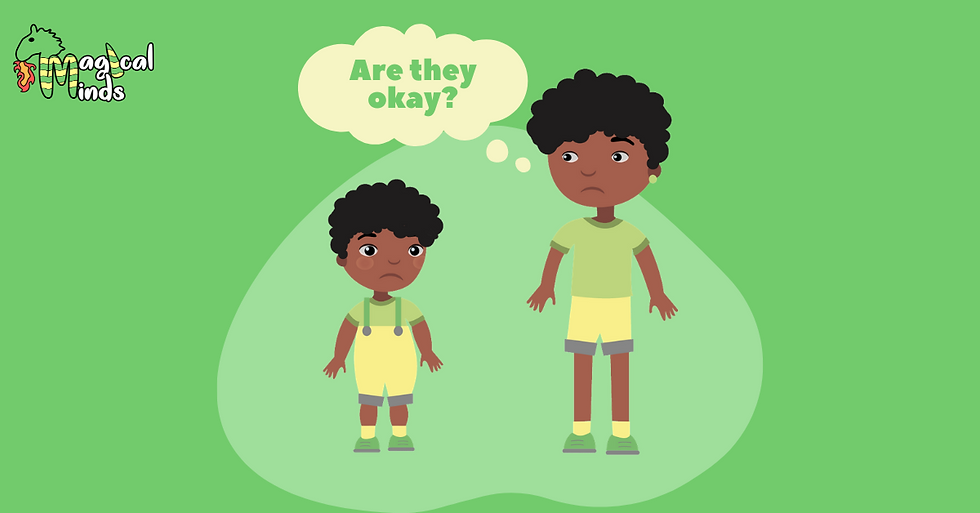Depression is on the rise in children and the signs are hard to recognise
- Magical Minds

- Jun 16, 2021
- 3 min read
Depression and mental illness are becoming increasingly common in children and often they’re too young to communicate how they’re feeling. Many of us think that mental health is only something adults struggle with, however, according to the Mental Health Foundation, 50% of mental health problems are established by age 14 and 75% by 24, with most starting at a very young age.
Anything from genetics to negative experiences in school can contribute to childhood depression. Although many experts are suggesting the use of screens and social media could be a huge contributing factor to the rise in mental illness in kids. The main issue is that these young children often don’t fully understand how they are feeling and cannot yet express their emotions. Meaning for parents, depression in their children is more difficult to spot.
At Magical Minds, we know just how difficult it can be to communicate with your children when they are feeling low and experiencing depression. It’s vitally important to catch the illness in the early formative years, as without diagnosis and treatment, many children will struggle with their mental health all the way through to their adult life.
Recognising the signs of depression in children
While depression is classed as a mental illness, it’s not uncommon for children to experience physical symptoms, like tiredness and stomach aches. Or even changes in their eating habits or sleep cycle. A child suffering from depression may withdraw from their friends, experience a change in activity level or start to perform poorly in school. Interestingly, Robert Bancroft, an advanced practice clinical leader of social work at CAMH in Toronto, USA, suggested that while adults with depression are likely to feel lethargic, kids with the condition are more likely to become hyperactive (Todays Parent, 2018).
Furthermore, Bancroft explains kids may act irritable, aggressive or just plain poorly behaved to push their parents away and avoid interactions when talking about their emotions. While all of us have bad days and times when we are angry or moody, what sets depression in children apart is that these feelings occur much more frequently. Dr Ashley Miller, a child psychiatrist at the BC Children’s Hospital, proposes if these behaviours are getting more intense and are happening most of the day, for at least two weeks in a row, then this could be a sign of depression.
What’s causing depression in children?
A combination of factors can cause depression in children. The child’s biology, psychology and environment can all be contributing factors, including genetics, trauma, abuse and relationship issues. Conditions like anxiety and ADHD can also increase the risk of depression.
Puberty is another significant factor. A girl’s risk of developing depression doubles in comparison to boys after hitting puberty and since many girls are increasingly starting puberty earlier, depression is also showing up sooner.
Unfortunately, most of these factors are out of the parent’s control. However, there is a factor parents do have a degree of control over. Experts are implying extensive screen time and social media use could be a huge contributing factor to the rise in mental illness in kids. A study conducted by psychologist Jean Twenge found that teenagers who spent five or more hours per day on their devices were 71% more likely to have one risk factor for suicide (NPR, 2017).
Helping a child with depression
Depression is quite treatable through psychosocial therapies, however, most individuals with the illness will struggle their whole lives. It is essential that parents seek help when they first recognise signs of depression in their child.
Cognitive behavioural therapy (CBT) is a good option for children with mental health issues. It’s a talking therapy that can help your child manage their problems by changing the way they think about them and behave. CBT can be as effective as medication in treating a child suffering from depression, but it is important to keep in mind CBT may not be suitable and as successful for everyone. A combination of CBT and medication such as antidepressants may be the best treatment for a child experiencing severe depression.
At Magical Minds, we want to provide you with the opportunity to better help your child understand their emotions and take ownership of their emotional responses in different situations. Visit our website today to find out more about our therapeutic tool which aids communication between you and your child. Click here to read more of our blogs.




Comments